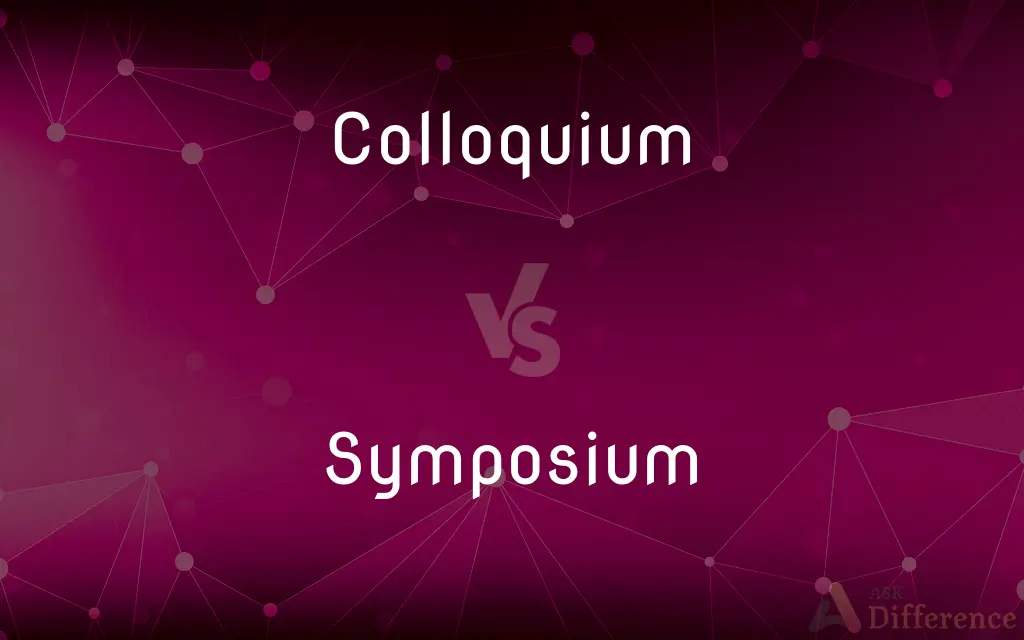Colloquium vs. Symposium — What's the Difference?
By Tayyaba Rehman & Fiza Rafique — Updated on February 25, 2024
Colloquium typically refers to an academic meeting for discussion, often with a series of presentations by various speakers, while a symposium is a formal gathering, usually with experts delivering speeches or papers on a specific topic.

Difference Between Colloquium and Symposium
Table of Contents
ADVERTISEMENT
Key Differences
A colloquium is an academic forum where researchers, scholars, or students gather to discuss a particular topic, often involving multiple speakers who present their work in turn. It's a platform for sharing research findings and methodologies. Conversely, a symposium is more structured and formal, involving experts or scholars who present papers or speeches on a specific subject, followed by discussions. This format is designed to delve deeply into a topic and foster interactive dialogue among participants.
Colloquia often serve as platforms for learning and information exchange within a specific academic community, facilitating networking and collaboration among participants. They might cover a range of topics within a broader subject area. Symposia, however, are typically focused on a narrower theme of interest, aiming to generate new insights and encourage scholarly debate among experts in the field.
The informal nature of colloquia allows for a wider range of discussion topics and more flexible presentation formats, including workshops, panel discussions, and Q&A sessions. This variety supports a broader educational purpose. Symposia, in contrast, usually have a more rigid structure, with scheduled presentations and discussions, emphasizing depth of discussion on predetermined topics.
Colloquia may occur regularly within an academic department or organization, serving as a routine forum for members to share insights and updates on their research. Symposia, however, are often one-off events or part of larger conferences, focusing on bringing together leading experts to tackle cutting-edge issues in the field.
The audience participation in colloquia is typically interactive, with the format encouraging questions and discussions throughout the presentations. Symposium audiences, while also encouraged to engage, often do so in a more formal Q&A session following each presentation, with the emphasis on learning from the experts.
ADVERTISEMENT
Comparison Chart
Focus
Broad academic discussion
In-depth exploration of a specific topic
Format
Multiple speakers, varied formats
Structured presentations and discussions
Frequency
Can be regular within an institution
Usually one-off events or part of larger conferences
Participation
Encourages interactive discussions among all attendees
Focused on expert presentations with formal Q&A sessions
Purpose
Information exchange, networking, and collaboration
Scholarly debate and generating new insights
Compare with Definitions
Colloquium
A forum for exchanging ideas within a scholarly community.
The colloquium offered insights into recent archaeological discoveries.
Symposium
A gathering to explore cutting-edge issues in a field.
The medical symposium addressed the latest in gene therapy research.
Colloquium
A gathering of scholars to present research findings.
She presented her thesis at the annual graduate colloquium.
Symposium
A formal meeting where experts discuss a specific topic.
The international symposium on climate change convened leading scientists.
Colloquium
A workshop or seminar for academic dialogue.
The colloquium on medieval literature included interactive workshops.
Symposium
A conference for presenting and debating scholarly papers.
He was invited to speak at a symposium on renewable energy technologies.
Colloquium
An academic meeting for discussion on a specific subject.
The physics department's weekly colloquium discussed quantum computing.
Symposium
An academic session focused on a particular theme.
The symposium on ancient civilizations brought together historians and archaeologists.
Colloquium
An event featuring a series of lectures on various topics.
The colloquium on sustainable development attracted experts worldwide.
Symposium
An event designed to foster in-depth discussion among specialists.
The symposium included panels on innovative urban planning.
Colloquium
An academic seminar on a broad field of study, usually led by a different lecturer at each meeting.
Symposium
A meeting or conference for the public discussion of some topic especially one in which the participants form an audience and make presentations
Colloquium
An academic meeting or seminar usually led by a different lecturer and on a different topic at each meeting.
Colloquium
An address to an academic meeting or seminar.
Colloquium
An academic meeting or seminar usually led by a different lecturer and on a different topic at each meeting
Colloquium
An address to an academic meeting or seminar
Common Curiosities
Are colloquia always related to academic subjects?
Primarily, yes, though they can cover any topic of interest to the academic community.
Is a symposium more formal than a colloquium?
Yes, symposia tend to have a more structured format and a formal atmosphere.
Who typically organizes symposia?
Professional associations, academic institutions, or research organizations usually organize them.
What is the main purpose of a colloquium?
To facilitate the exchange of ideas and research findings within an academic community.
Can non-experts attend symposia?
Yes, though they are primarily aimed at specialists, interested non-experts are often welcome.
What types of topics are discussed in colloquia?
Topics can vary widely, from specific research findings to broad discussions on trends in a field.
Do symposia result in publications?
Often, papers presented at symposia are published in special conference proceedings or academic journals.
How does a symposium differ from other academic conferences?
A symposium is more focused on a specific topic, with expert-led presentations and discussions.
Can students present at a colloquium?
Yes, colloquia often encourage presentations from students as well as seasoned researchers.
Do participants need to prepare for colloquia?
Preparation varies; some may present, while others attend for learning and discussion.
Are symposia always held in person?
Traditionally, yes, but virtual symposia have become more common due to technology and global connectivity.
Is prior research necessary to participate in a colloquium?
Not always, but having research to present or discuss is common for participants.
How are speakers chosen for symposia?
Speakers are usually invited based on their expertise and contributions to the field.
Can colloquia lead to collaborative projects?
Yes, they are often a breeding ground for future research collaborations.
What is the typical duration of a symposium?
It can range from a single day to several days, depending on the scope.
Share Your Discovery

Previous Comparison
Relationship vs. Correlation
Next Comparison
Cyan vs. BlueAuthor Spotlight
Written by
Tayyaba RehmanTayyaba Rehman is a distinguished writer, currently serving as a primary contributor to askdifference.com. As a researcher in semantics and etymology, Tayyaba's passion for the complexity of languages and their distinctions has found a perfect home on the platform. Tayyaba delves into the intricacies of language, distinguishing between commonly confused words and phrases, thereby providing clarity for readers worldwide.
Co-written by
Fiza RafiqueFiza Rafique is a skilled content writer at AskDifference.com, where she meticulously refines and enhances written pieces. Drawing from her vast editorial expertise, Fiza ensures clarity, accuracy, and precision in every article. Passionate about language, she continually seeks to elevate the quality of content for readers worldwide.














































